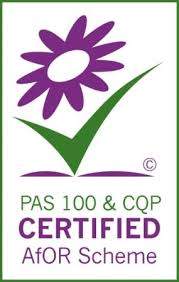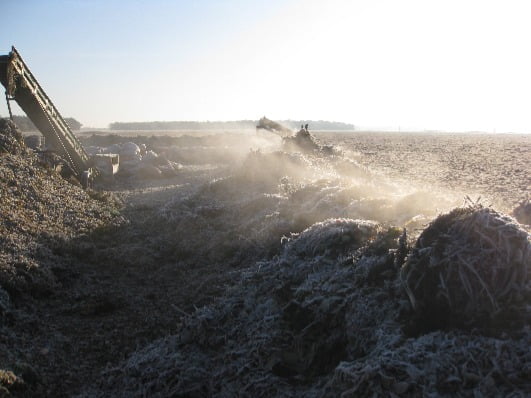
Find out about, PAS100 Compost the Accredited Quality Protocol for the UK Composting Industry.
Updated BSI PAS 100 Compost Quality Standard
A brand-new upgraded version of the 2011 standard was added in 2018. A new ‘compost quality' condition has been inserted making more clear the existing needs to produce compost that is fit-for-purpose (suitable for designated use) by examining as well as agreeing with customers in writing any type of high quality needs that are much more stringent or more widely varying than the minimum standard top quality needs specified in the PAS.
Demands for a team strategy to creating a Safety & Quality Control System (SQCS). The previous Haz Analysis and Crucial Control Point (HACCP) area of PAS100:2011 has been re-written to prolong the demands. PAS100:2018 calls for producers to establish a SQCS to think about threats affecting quality along with safety, pertinent to the planned use of the garden compost.
This additionally connects to a brand-new ‘garden compost quality' provision.
A requirement is now present for compost to be re-assessed for compliance with the demands of the ‘compost high quality' provision when stored for a period of six months or longer. A need that restricts the dispatch of experienced sets of compost for usage until after the examination results have actually been examined for uniformity to PAS100.
Back in March 2007, the News we published was the announcement of the PAS100 Accredited Quality Protocol, which had just been published for the UK Composting Industry, with the aim of making high quality commercially produced compost from municipally collected green waste a valuable marketable product.
Today we look back on the PAS100 publicly available specification, and the events, which starting with the initial protocol announcement in 2007:
[box type=”alert” style=”rounded” border=”full”]Scroll down to the bottom if you want a source of UK wholesale green waste compost prices, updated monthly.[/box]
PAS100 Compost: Accredited Quality Protocol Published for Composting Industry
(15.03.07) The PAS100 Accredited Quality Protocol for Compost was published today, promising to cut red tape for composting companies and help them market their compost as a quality product.
Developed by the Environment Agency and the Waste and Resources Action Programme, it has also had input from the Composting Association and the National Farmers Union.
The protocol aims to give certainty for the marketplace that compost is a valuable resource, rather than a “waste”.
It will see composters that process organic waste to the PAS100 Accredited Quality Protocol are able to classify their material as a “product”, rather than a “waste”.

It means they will be able to store, manage and sell their compost without it being governed by waste regulations, and should boost sales to higher end markets including landscaping, agriculture and horticulture.
Speaking to letsrecycle.com, Dr Nina Sweet, part of the waste regulation policy team at the Environment Agency said:
“It is all about increasing choice for composters. The chief benefit of the Protocol is the level of certainty it will provide for the marketplace that the material will no longer be a waste. It will hopefully allow the development of the industry to go forward and the industry has said very strongly that it wants this opportunity.”
PAS100 Accredited Quality Protocol Accreditation:
Over 100 composters are already PAS100-accredited, and many others are in the process of seeking accreditation. Those already accredited will need to check the acceptable list of inputs in the Protocol to ensure they are composting only those input types allowed. More at the Letsrecycle web site.
UPDATE (April 2018): On Certified PAS100 Accredited Quality Protocol Composts
Our research shows that products were very soon available using the scheme, which is still running:
In 2004 Bryn Quarry was successful in registering and being accredited with PAS100 by the Composting Association. In July 2009 Bryn Quarry was accredited with a Green Compass PAS402 certificate, one of only 10 companies in Wales. This is a new British … via Farmingtowaste
Warrior Compost is made from green waste collected from Wiltshire residents. It is peat-free, certified to BSI PAS100 standard and accredited by both the Association for Organics Recycling and the Soil Association.
We create an analysis from all our samples (right) so, for example, from our green waste with food included compost we can show growers that the application rate of this product (PAS100 Accredited Quality Protocol compliant compost) at 37t/ha is the equivalent of £550 worth of fertiliser. via soil recovery
Restoring landscapes affected by mineral extraction
Welsh local authorities, and quarrying and mining companies with an interest in the restoration of landscapes affected by mineral extraction were invited to attend a free interactive showcase, hosted by Welsh Slate and WRAP Cymru at Penrhyn Quarry in Bethesda, North Wales on November 2, 2011.
Owned by Welsh Slate, Penrhyn Quarry is WRAP Cymru’s first large-scale landscape restoration project and forms part of WRAP’s commitment to the remodelling of landscapes that are affected by quarrying.
The showcase PAS100 Accredited Quality Protocol Lecture, demonstrated first-hand how the use of quality compost can produce sustainable, cost-effective and sensitive restoration of landscapes affected by the extractive industry.
Lance Jones, organics project manager at WRAP Cymru, which has been working with Welsh Slate and other extraction companies across Wales to restore quarry sites, said: “Topsoil is in scarce supply, and restoring land used for mineral extraction is often expensive and difficult, carrying a number of risks.
“Operators have, in the past, tried to make use of the left-over soils on site but this material is often unsuitable because its organic nutrient content and overall structure is depleted, meaning that very little vegetation can grow.
via Showcaserestoringlandscapes
Compost Specifications Today (2018)
There are now a number of specifications which are applicable to compost. These specifications were initially started in 2007, when the in April 2007 the Compost Quality Protocol came into force. They help to provide a basic level of confidence in the quality and the safety of compost for sale commercially in the UK. That means that as from 2007, composting organisations have to follow strict procedures to ensure specifications are met before their product can be incorporated into compost. That compost is no longer a waste, and can be freely sold to the public in mainstream commercial outlets in the UK.
More information is available on this scheme via the UK government WRAP website here.
The author of this post believes that substantial quantities of green waste compost are now used in the mainstream commercial garden composts sold each year in the UK. Green waste compost is mixed with peat in many of the popular brands, at rates up to about 10%.
While this is clearly an advance and reduces the use of non-renewable peat, peat use continues. It has not acted, in the way many hoped it would in 2007, which was to replace peat in garden compost, and cease the unsustainable use of peat. So, natural peatland depletion continues.
Other Compost Specifications
PAS 100 requires that certified composters develop and maintain a management system, and a quality policy to a minimum stated standard, to ensure that their compost is fit-for-purpose.
1. Compostable packaging – EN 13432
Some packaging is manufactured to be compostable. There is already a standard which compostable packaging must meet. The standard, EN 13432, was developed in the wake of the Packaging Waste Directive and is recognised by EC countries. The standard ensures that the material is suitable for organic recovery.
2. Digestate specifications – Quality Protocol and PAS 110
The Quality Protocol for digestate was published in January 2009, alongside the PAS 110 specification. Together, they provide criteria which allow the digestate produced by the anaerobic digestion process to escape waste regulation, therefore making it easier for the material to find end markets.
BSI PAS 110 covers all anaerobic digestion (AD) systems that accept source-segregated biowastes.
It specifies:
- Controls on input materials and the management system for the process of anaerobic digestion and associated technologies
- Minimum quality of whole digestate, separated fibre and separated liquor
- Information that is required to be supplied to the digestate recipient
- To find out more click here.
Pricing Information on Compost Letsrecycle.com Price Specifications
Letsrecycle.com provides three prices to indicate trends in the cost of UK composting and anaerobic digestion.
They provide the typical gate fee paid by a local authority or contractor to deposit green waste at a composting facility. This will usually be a negative price, because it is a charge for disposal of the material – the composting company does not pay for the green waste. As composting gate fees can be below landfill prices (which also incur landfill tax) composting can prove a more attractive route for green waste disposal.
They also provide a second price for compost gaining accreditation from Defra under the Animal By-Products Regulations 2003. It indicates the gate fee at a composting facility for organic waste which may contain catering waste – otherwise known as kitchen waste.
The Letsrecycle.com compost prices are available here.





